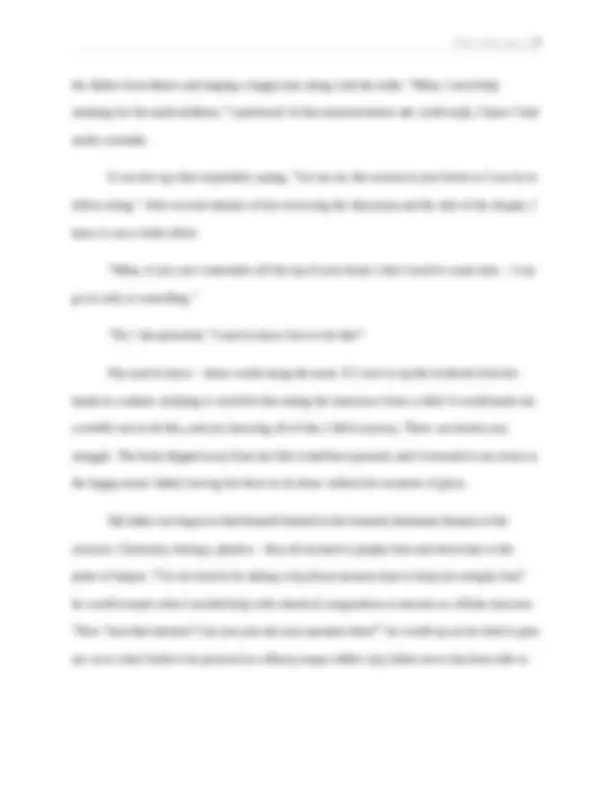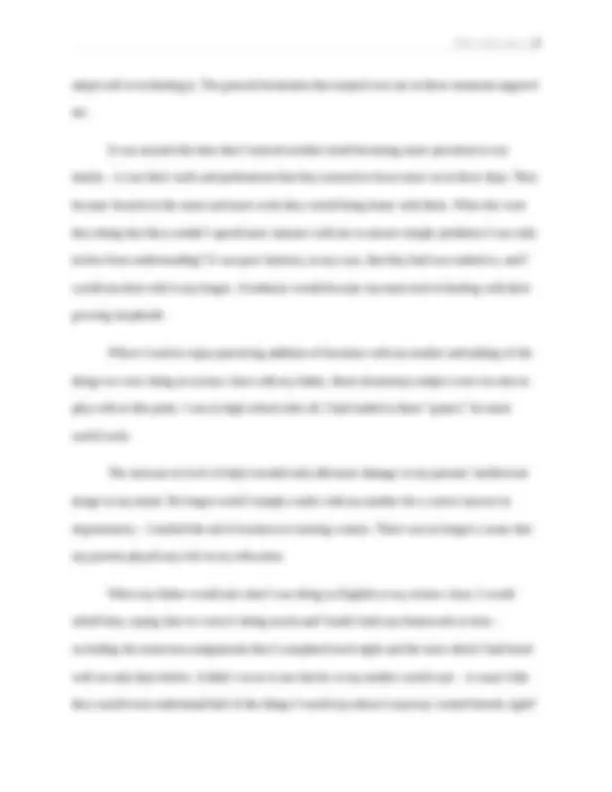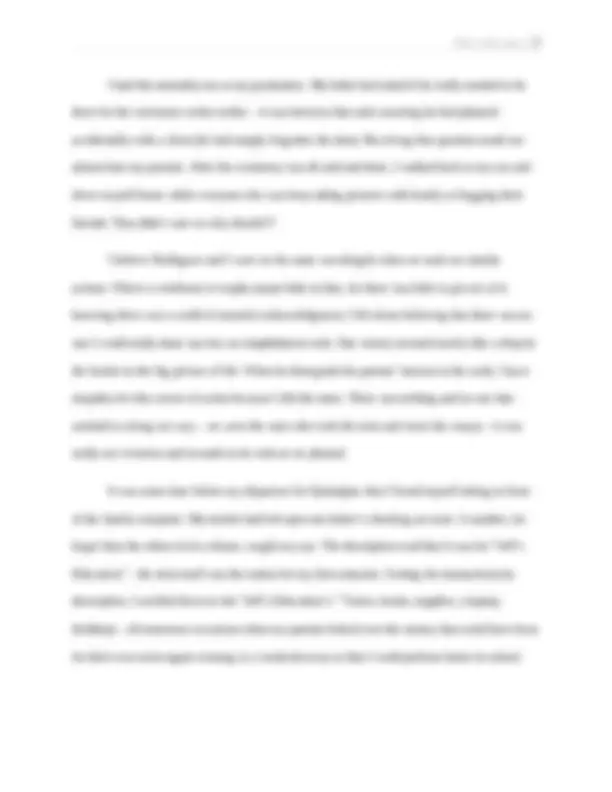





Study with the several resources on Docsity

Earn points by helping other students or get them with a premium plan


Prepare for your exams
Study with the several resources on Docsity

Earn points to download
Earn points by helping other students or get them with a premium plan
Community
Ask the community for help and clear up your study doubts
Discover the best universities in your country according to Docsity users
Free resources
Download our free guides on studying techniques, anxiety management strategies, and thesis advice from Docsity tutors
This essay explores the author's experience of entering high school and the challenges of seeking academic help from parents whose knowledge seemed to wane as the workload increased. The author reflects on the impact of their parents' professions and work ethic on their education and their own growing independence.
Typology: Assignments
1 / 6

This page cannot be seen from the preview
Don't miss anything!




Jeff Abrahams Rodriguez essay, Rough draft 3 English 101 Section 52 Professor Rounds Sept. 11, 2009 Learning and My Parents When I entered high school, a majority of the way my life worked changed. Of course, the new environment is always something people deal with differently. I however adapt to new situations fairly well – I love the prospect of a new frontier. It was within the individual environments that I had the difficulties. In elementary or middle school, the workload is meant to prepare you for high school (which in turn prepares you for college) so it was never really a challenge. My parents had impressed upon me the values that theirs had passed on to them. As children of survivors of the Great Depression, our family held high the notion that it was to work hard and to succeed at doing so. My sister and I were taught to vie for a better job than we were initially capable of, the mentality that would always push us to do our best work. We would seek outside help from our parents because they had claimed that their areas of expertise were practically everything that we could come across in a primary school learning environment. My mother’s personal claim to fame was that she had gotten a perfect score on the math section of the SATs – a feat that should astound anyone at first glance. She had attended Cornell University, while my English-and science-minded father went to Boston College.
We would grow to see them as infallible in a way. Their knowledge could even surpass teachers’ when they would review our graded tests and discover an incorrectly marked answer to boost our grades. It was prideful and impressive, from a child’s perspective, to see that one’s parents could outsmart those who were meant to… well, make us smarter. My parents’ knowledge seemed to be infinite, and occasions where they replied “I don’t know,” as infrequent as these occurrences were, meant only that I was to discover the truth in order to make up for their inexperience. But as I said before, high school changed everything. The many more classes, subjects, and assignments seemed to wear down my parents’ knowledge. Algebra was where I first noticed that I had exhausted my mother’s help. As the homework became longer, so did her time to respond; her enthusiasm also took a major hit. Where she may have previously jumped upon a math problem and ticked away at the calculator, she now sat still, rereading the instructions to herself. After multiple attempts on her part and several minutes of my straining to recall the process from class, I would pick up my materials and move on to another subject that I deemed my strong-suit while she would continue to confer with herself as to what the steps for a solution were. She refused to be defeated, however, telling me constantly “I used to know how to…” or “Wow, they’re teaching you this ?” I would come to know that while my mother may have gotten a perfect score on her math section of the SATs, the test was something completely different (easy) in those days. I remember one specific night just before my first midterm in high school. I came across a unit that I could not recall how to go about solving the problems. After trying several times unsuccessfully to follow my own work on the worksheets and homework I had completed on the subject, I turned to my last (immediate) resource. In the kitchen, my mother was busily scrubbing
adapt well to technology). The general frustration that seeped over me in these moments angered me. It was around this time that I noticed another trend becoming more prevalent in our family – it was their work and professions that they seemed to focus more on in these days. They became fixated on the more and more work they would bring home with them. What else were they doing that they couldn’t spend mere minutes with me to answer simple problems I was only inches from understanding? It was pure laziness, in my eyes, that they had succumbed to, and I would not deal with it any longer. Avoidance would become my main tool of dealing with their growing ineptitude. Where I used to enjoy practicing addition of fractions with my mother and talking of the things we were doing in science class with my father, those elementary subject were too trite to play with at this point. I was in high school after all. I had traded in these “games” for more useful tools. The increase in level of help I needed only did more damage to my parents’ intellectual image in my mind. No longer could I simply confer with my mother for a correct answer in trigonometry – I needed the aid of teachers or tutoring centers. There was no longer a sense that my parents played any role in my education. When my father would ask what I was doing in English or my science class, I would rebuff him, saying that we weren’t doing much and I hadn’t had any homework or tests – excluding the numerous assignments that I completed each night and the tests which I had fared well on only days before. It didn’t occur to me that he or my mother would care – it wasn’t like they would even understand half of the things I would say about it anyway; wasted breath, right?
I had this mentality too at my graduation. My father had asked if he really needed to be there for the ceremony weeks earlier – it was between that and a meeting he had planned accidentally with a client (he had simply forgotten the date). Receiving that question made me almost hate my parents. After the ceremony was all said and done, I walked back to my car and drove myself home while everyone else was busy taking pictures with family or hugging their friends. They didn’t care so why should I? I believe Rodriguez and I were on the same wavelength when we took our similar actions. Where a certificate or trophy meant little to him, for there was little to get out of it knowing there was a world of material acknowledgment, I felt alone believing that there was no one I could really share my true accomplishment with. One victory seemed merely like a drop in the bucket in the big picture of life. When he disregards his parents’ interest in his work, I have empathy for this course of action because I did the same. There was nothing and no one that assisted us along our way – we were the ones who took the tests and wrote the essays – it was really our victories and rewards to do with as we pleased. It was some time before my departure for Quinnipiac that I found myself sitting in front of the family computer. My mother had left open my father’s checking account. A number, far larger than the others in its column, caught my eye. The description read that it was for “Jeff’s Education” – the item itself was the tuition for my first semester. Sorting the transactions by description, I scrolled down to the “Jeff’s Education’s.” Tutors, books, supplies, a laptop, fieldtrips – all numerous occasions when my parents forked over the money that could have been for their own extravagant evening or a weekend away so that I could perform better in school.